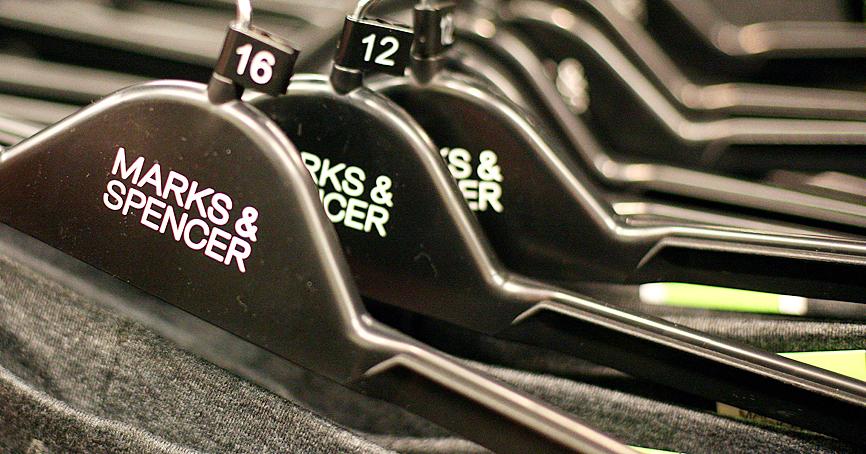British retailer Marks & Spencer (M&S) on Wednesday became one of the first major brands to back a drive to stop forced labor in cotton and garment sourcing from China’s Xinjiang region.
M&S signed a call to action by The Coalition to End Forced Labour in the Uyghur Region — consisting of more than 300 civil society groups — to cut ties with suppliers in China that profit from the forced labor of the ethnic Uighurs and other Muslims.
“This is in line with the company’s long-term focus on ensuring its supply chains are sustainable and ethical, where workers are treated fairly, and their human rights are respected,” the company said on its Web site.

Photo: AFP
The UN estimates China has detained at least 1 million Uighurs and other minorities in camps in Xinjiang, where many of them are said to be put to work in textile factories.
US think tank the Center for Global Policy has said at least 570,000 people were forced to pick cotton by hand under a labor program targeting ethnic minority groups in the region.
China has denied mistreatment and said the camps offer vocational training and help to fight terrorism and extremism.
M&S said it did not work with any supplier in or source from Xinjiang, but publicly supported the call to action to “help play its part in driving meaningful change at scale.”
Xinjiang, home to about 11 million ethnic Uighurs, produces about 85 percent of China’s cotton and 20 percent of the global supply, which is used by fashion brands worldwide.
“When it comes to sustainable and ethical clothing, we can only achieve real change at scale by working with others,” M&S Clothing & Home managing director Richard Price said.
Anti-slavery organizations welcomed the announcement by M&S and urged other global retailers to follow suit.
Some brands have privately backed the appeal and should soon go public with their support, said Chloe Cranston, business and human rights manager at Anti-Slavery International.
“Other big companies are close to committing, and we hope M&S’ public statement will push them over the line,” she said.
While most brands say they do not have relationships with factories in Xinjiang, their supply chains are likely tainted by cotton picked by Uighurs that is exported across China and used by other suppliers, campaigners and researchers have said.
Several clothing giants, from Gap to Zara owner Inditex, said last year that they did not source from Xinjiang, but could not confirm their operations were free of cotton from the area.
Anti-Slavery International and the French labor rights coalition Collectif Ethique sur l’etiquette have urged governments to make companies liable for abuses in their supply chains, saying well-meaning words fell short of action.
Additional reporting by AFP

‘IN A DIFFERENT PLACE’: The envoy first visited Shanghai, where he attended a Chinese basketball playoff match, and is to meet top officials in Beijing tomorrow US Secretary of State Antony Blinken yesterday arrived in China on his second visit in a year as the US ramps up pressure on its rival over its support for Russia while also seeking to manage tensions with Beijing. The US diplomat tomorrow is to meet China’s top brass in Beijing, where he is also expected to plead for restraint as Taiwan inaugurates president-elect William Lai (賴清德), and to raise US concerns on Chinese trade practices. However, Blinken is also seeking to stabilize ties, with tensions between the world’s two largest economies easing since his previous visit in June last year. At the

UNSETTLING IMAGES: The scene took place in front of TV crews covering the Trump trial, with a CNN anchor calling it an ‘emotional and unbelievably disturbing moment’ A man who doused himself in an accelerant and set himself on fire outside the courthouse where former US president Donald Trump is on trial has died, police said yesterday. The New York City Police Department (NYPD) said the man was declared dead by staff at an area hospital. The man was in Collect Pond Park at about 1:30pm on Friday when he took out pamphlets espousing conspiracy theories, tossed them around, then doused himself in an accelerant and set himself on fire, officials and witnesses said. A large number of police officers were nearby when it happened. Some officers and bystanders rushed

Beijing is continuing to commit genocide and crimes against humanity against Uyghurs and other Muslim minorities in its western Xinjiang province, U.S. Secretary of State Antony Blinken said in a report published on Monday, ahead of his planned visit to China this week. The State Department’s annual human rights report, which documents abuses recorded all over the world during the previous calendar year, repeated language from previous years on the treatment of Muslims in Xinjiang, but the publication raises the issue ahead of delicate talks, including on the war in Ukraine and global trade, between the top U.S. diplomat and Chinese

RIVER TRAGEDY: Local fishers and residents helped rescue people after the vessel capsized, while motorbike taxis evacuated some of the injured At least 58 people going to a funeral died after their overloaded river boat capsized in the Central African Republic’s (CAR) capital, Bangui, the head of civil protection said on Saturday. “We were able to extract 58 lifeless bodies,” Thomas Djimasse told Radio Guira. “We don’t know the total number of people who are underwater. According to witnesses and videos on social media, the wooden boat was carrying more than 300 people — some standing and others perched on wooden structures — when it sank on the Mpoko River on Friday. The vessel was heading to the funeral of a village chief in